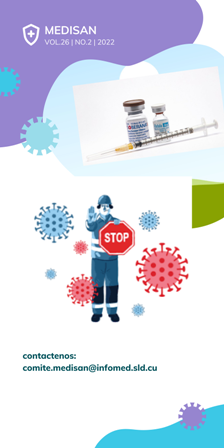Metodología para la formación del residente de cirugía general en la atención integral al paciente con cáncer de colon
Palabras clave:
metodología, curriculum, internado y residencia, cirugía general, cáncer de colon.Resumen
Introducción: El programa de especialización en cirugía general comprende el tema cáncer de colon en la especialidad de coloproctología, en el segundo año, cuya duración se reduce a un mes; tiempo totalmente insuficiente para abarcar todos los contenidos teóricos y prácticos pertinentes. Por ello, se propone una metodología para la formación del residente de cirugía general en la atención integral al paciente con cáncer de colon, para lo cual se aplicaron los métodos teóricos de análisis y síntesis, de sistematización y generalización de experiencias, así como el sistémico estructural funcional y el holístico dialéctico.
Desarrollo: La intencionalidad formativa declarada en el currículo no se corresponde con la orientación sistematizadora y la generalización formativa, como contradicción dialéctica y principio de la didáctica de la educación superior; tampoco existe una adecuada sistematización epistemológica y metodológica, lo que se evidencia por la fragmentación, falta de coherencia y flexibilidad para su aplicación en el variado contexto donde ocurre la formación del cirujano. La fragmentación formativa asistémica muy abarcadora del currículo no dinamiza el proceso pedagógico de esta especialización para cumplimentar los objetivos indicados.
Conclusiones: Esta propuesta estratifica los contenidos teóricos y prácticos para el tema cáncer de colon en específico, con un nivel de complejidad ascendente durante toda la especialización en cirugía general, y de conjunto con la realización efectiva de las actividades concernientes a la educación en el trabajo, lo que puede contribuir a la formación de este profesional en la atención integral al paciente con cáncer de colon.
Descargas
Citas
2. Marks KM, West NP, Morris E, Quirke P. Clinicopathological, genomic and immunological factors in colorectal cancer prognosis. British Journal of Surgery. 2018 [citado 05/12/2021];105(2):99-109. Disponible en: https://www.ncbi.nlm.nih.gov/pmc/articles/PMC7938848/pdf/bjs10756.pdf
3. Cuba. Ministerio de Salud Pública, Dirección de Registros Médicos y Estadísticas de Salud. Anuario Estadístico de Salud 2020. La Habana: MINSAP; 2021 [citado 05/12/2021]. Disponible en: https://salud.msp.gob.cu/wp-content/Anuario/anuario_2019_edici%C3%B3n_2020.pdf
4. Cuba. Ministerio de Salud Pública. Resolución No. 344/2015. Plan de estudio y Programa de la Especialidad de Cirugía General. La Habana: MINSAP; 2015 [citado 28/01/2021]. Disponible en: https://docplayer.es/91715263-Republica-de-cuba-ministerio-de-salud-publica-resolucion-no-344.html
5. Cuba. Ministerio de Salud Pública. Resolución 140/2019. Reglamento de la Educación de posgrado de la República de Cuba. La Habana: MINSAP; 2019.
6. Rodríguez-Fernández Z, Soler-Morejón CD. Dimensiones de la educación en el trabajo en la docencia médica cubana. EDUMECENTRO. 2020 [citado 28/01/2021];12(4):208-26. Disponible en: http://www.revedumecentro.sld.cu/index.php/edumc/article/view/1540/html_629
7. Quintana-Santiago YM, Mur-Villar N, Quintana-Regalado G, Bernaza-Rodríguez GJ. Retos que impone la educación en el trabajo en las universidades de ciencias médicas. Revista Conrado. La investigación: retos y perspectivas en la educación superior. 2021 [citado 08/11/2021];17(S3):452-55. Disponible en: https://conrado.ucf.edu.cu/index.php/conrado/article/view/2186/2127
8. Estepa-Pérez JL, Santana-Pedraza T, Estepa-Ramos JL. Cualidades necesarias y valores en el cirujano contemporáneo. MediSur. 2019 [citado 08/11/2021];17(5):752-6. Disponible en: http://scielo.sld.cu/scielo.php?script=sci_arttext&pid=S1727-897X2019000500752&lng=es
9. Asociación Médica Mundial. Declaración de Helsinki de la AMM - Principios éticos para las investigaciones médicas en seres humanos. Asociación Médica Mundial. 2018 [citado 14/12/2021]. Disponible en: https://www.wma.net/es/policies-post/declaracion-de-helsinki-de-la-amm-principios-eticos-para-las-investigaciones-medicas-en-seres-humanos/
10. Rodríguez-Fernández Z, Rizo-Rodríguez RR, Mirabal-Fariñas A, Nazario-Dolz AM, García Céspedes ME. La reunión de alta al egreso hospitalario como doble vínculo entre la docencia y la atención primaria de salud. Educación Médica Superior. 2017 [citado 14/12/2021];31(3). Disponible en: http://www.ems.sld.cu/index.php/ems/article/view/994/562
11. Cuba. Ministerio de Salud Pública. Resolución 108/2004. Reglamento del régimen de residencias en ciencias de la salud. La Habana: MINSAP; 2004.
12. Rizo-Rodríguez RR, Figueredo AS, Rodríguez-Fernández Z. La conferencia como forma de organización del proceso de enseñanza aprendizaje en la educación médica superior. Educación Médica Superior. 2018 [citado 14/12/2021];32(2). Disponible en: http://ems.sld.cu/index.php/ems/article/view/1350/667
13. Rodríguez-Fernández Z, Rizo-Rodríguez RR, Nazario-Dolz AM, Mirabal-Fariñas A, García-Céspedes ME. Pase de visita docente asistencial: modalidad relevante de la educación en el trabajo en la enseñanza médica superior. Panorama: Cuba y Salud. 2018 [citado 14/12/2021];13(1):81-7. Disponible en: http://www.revpanorama.sld.cu/index.php/panorama/article/download/709/pdf_142
14. De la Peña-Consuegra G, Velázquez-Ávila RM. Algunas reflexiones sobre la teoría general de sistemas y el enfoque sistémico en las investigaciones científicas. Revista Cubana de Educación Superior. 2018 [citado 14/12/2021];37(2):31-4. Disponible en: http://scielo.sld.cu/scielo.php?script=sci_arttext&pid=S0257-43142018000200003&lng=es&tlng=es
15. García Céspedes ME, Fuentes González HC, Zaldívar Álvarez E, Bell Castillo J. Aportes de las investigaciones pedagógicas a la educación médica cubana. MEDISAN. 2019 [citado 08/12/2021];23(6):1045-57. Disponible en: http://scielo.sld.cu/scielo.php?script=sci_arttext&pid=S1029-30192019000601045&lng=es
16. Vidal-Ledo M, Fernández-Oliva B, Miralles-Aguilera E. Didácticas especiales en las ciencias de la salud. Educación Médica Superior. 2021 [citado 14/12/2021];35(4):e3063. Disponible en: http://www.ems.sld.cu/index.php/ems/article/view/3063/1279
Publicado
Cómo citar
Número
Sección
Licencia
Esta revista provee acceso libre e inmediato a su contenido bajo el principio de que hacer disponible gratuitamente investigación al público, apoya aún más el intercambio de conocimiento global. Esto significa que los autores/as conservarán sus derechos de autor y garantizarán a la revista el derecho de primera publicación de su obra, el cuál estará simultáneamente sujeto a la licencia internacional Creative Commons Atribución 4.0 que permite copiar y redistribuir el material en cualquier medio o formato para cualquier propósito, incluso comercialmente, además de remezclar, transformar y construir a partir del material para cualquier propósito.





